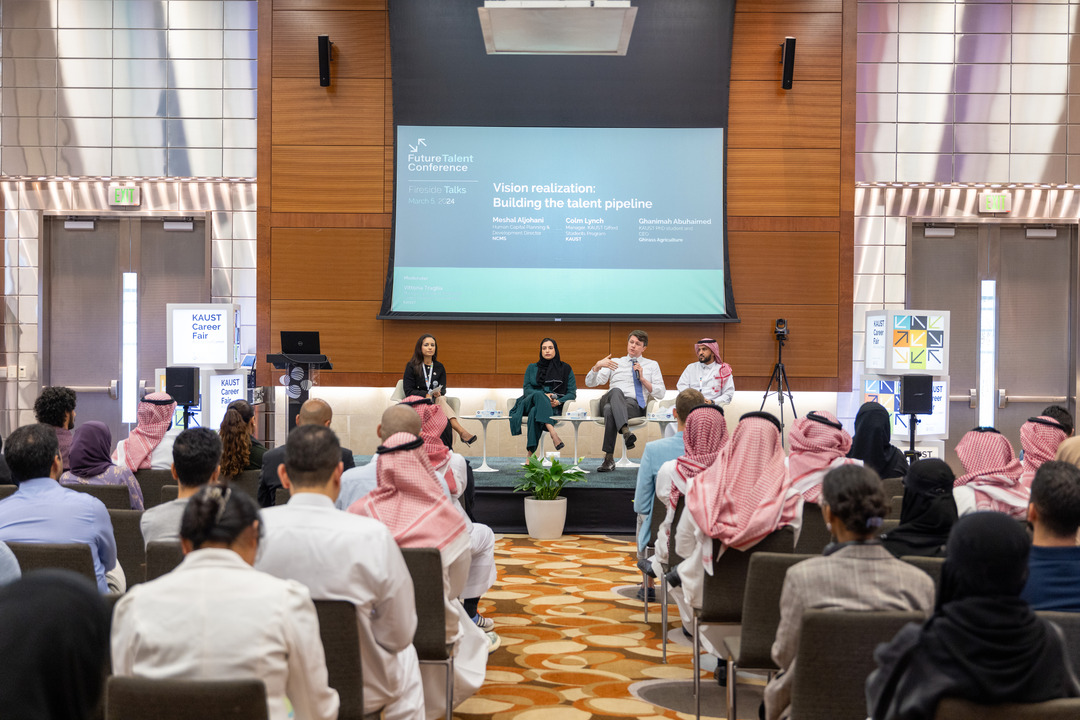Fireside Talks show how KAUST is matching industry’s talent needs

This year's Fireside Talks featured academic and industry experts exploring market trends and the Kingdom’s evolving workforce landscape.
King Abdullah University of Science and Technology (KAUST) leads innovation and industry partnerships that drive artificial intelligence and sustainability adoption, as highlighted during the Future Talent Conference: Fireside Talks, where KAUST’s strategic talent preparation for Saudi Arabia’s evolving labor landscape took center stage. The day was broken into three talks by industry and KAUST representatives across the country that were aimed to show the talent pipeline being built in the Kingdom for critical industries.
Hosted alongside the KAUST Spring Career Fair, March 5-6, the Fireside Talks featured academic and industry experts exploring market trends and the Kingdom’s evolving workforce landscape. Dr. Najah Ashry, KAUST Vice President for Strategic National Advancement (SNA), said KAUST fosters technological excellence and sustainable growth within Saudi Arabia through its collaborative research and skilled-workforce development.
“We stand at the crossroads of an era defined by transformative change, not just in the Kingdom, but globally. Our journey to a ‘green’ economy and technological mastery is a tangible reality. It’s unfolding through KAUST’s strategic initiatives and global collaborations. At KAUST, our role within this transformation is clear — to cultivate talent and professional expertise needed to navigate these changes.”
Drawing from her own experience, Ghanimah Abuhaimed, a KAUST Ph.D. student and CEO of Ghirass Agriculture, highlighted the importance of capitalizing on academic innovations through entrepreneurship. She said scientists must learn to think more akin to businesspeople, and vice versa. “This is being done at KAUST through its strategy.”
Focus on specific sectors
Among the many industries KAUST education aims to support is AI and sustainability.
“AI is going to transform every aspect of our civilization,” Dr. Jürgen Schmidhuber, Director of KAUST’s AI Initiative, said about the revolutionizing role of automation, which will replace most essential jobs humans currently perform. Although AI will change all components of human society, including the job market, he added, new career opportunities will arise, with competition for skilled labor remaining between people, and not against machines.
Potential for job augmentation and efficiencies via human-AI collaborations will persist, noted Dr. Yaser Alonaizan, CEO, National Center for AI, Saudi for Data and Artificial Intelligence Authority (SDAIA). He cited adaptability and creativity as strong human traits in the transition. Partnering with institutions like KAUST to optimize AI also matters. “It’s an exciting time right now with what’s happening in AI generally. It’s a golden opportunity in Saudi Arabia.”
The same is true for sustainability. There is clear potential for innovation, new careers and economic diversification in Saudi Arabia said Dr. Rúben Costa, KAUST Sustainability Engagement and Performance Lead. “While we face significant challenges, the path towards sustainability in Saudi Arabia provides endless opportunities. For young professionals, this is a remarkable chance to drive innovation and a pivotal moment to shape their careers and contribute to a more sustainable world.”
Dr. Ameerah Bokhari, Aramco Sustainability Research Program Lead and Senior Petroleum Scientist, said all sectors, particularly oil and gas, aim to optimize their operations, making them more sustainable and energy-transition focused. This requires a workforce with interdisciplinary prowess and academia support. “To enable these new technologies, we must highly invest in research and development.”

